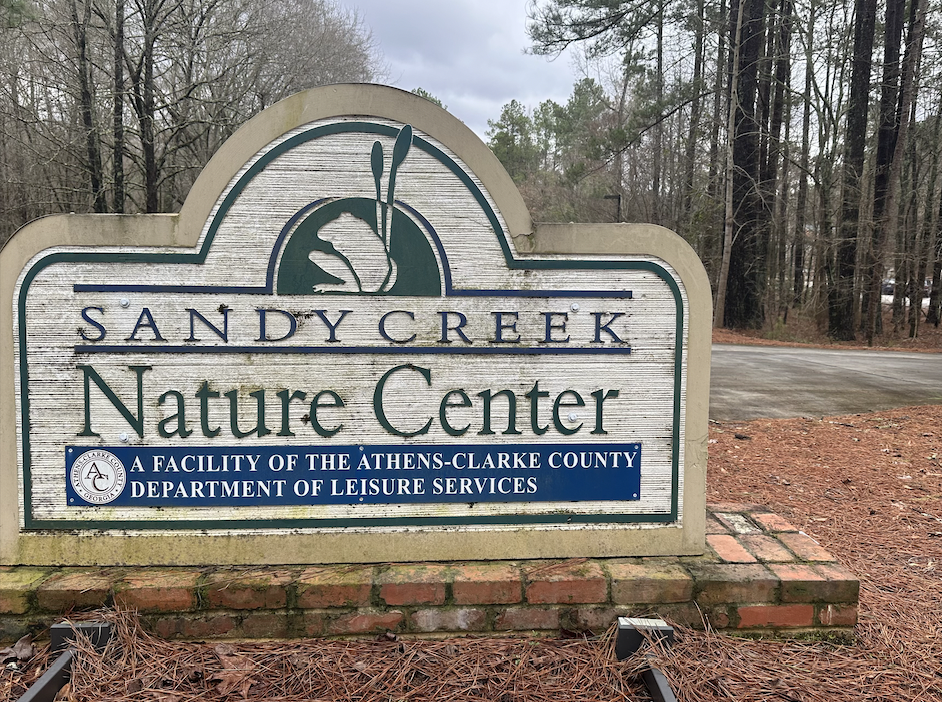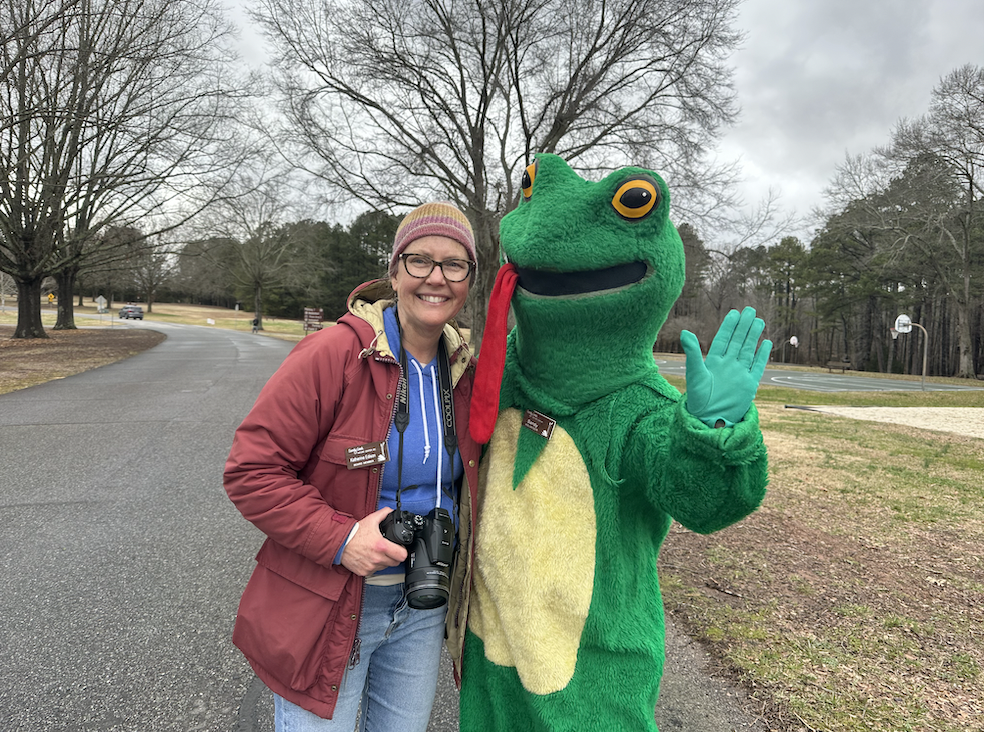Love is in the air.
Or is it just smog?
Efforts to combat climate change often educate people on steps they can take toward sustainability, but even with the knowledge, getting people to actually change their daily habits and personal routines can be harder to instill.
Understanding the need for a shift in focus, leaders across the globe and locally in Athens, Georgia are striving towards first increasing peoples’ desires to be sustainable, rather than educating on ways they can be, by getting communities connected to nature on a personal level.
Race participants Frances Taylor and Stephen Rives talk about why they love nature before running in the Frog Hop 5K, held at Sandy Creek Nature Center on Feb. 12, 2023. (Video/Lauren Minnick)
Being Sustainable Because You Want To
Sustainability Officer of Athens Clarke County Government Mike Wharton has spent over 40 years working directly in fighting climate change through instilling sustainable practices in the Athens community. Wharton said that over time, people will only take action at the suggestions of others for so long.
“It’s better if we can get people to be sustainable because they want to do it. By discovering a love of our nature, we then look for ways to preserve those things. If you care for something, you’ll figure it out.”
Wharton’s instincts gained from his lifetime of experiences in the field are echoed in recent research from climate and behavioral scientists around the world in a field known as “positive sustainability psychology.”
Research in Positive Sustainability Psychology
Defined as “mental well-being manifested by healthy behaviors and feelings of fulfillment and happiness,” this line of research in correlation to the environment centers around studies showcasing that time spent connected to nature has a profound impact on people’s health, and in turn, their desire to put effort back into the health of the environment.
A study published in 2020 by researchers from the University of Sonora and the Technological Institute of Sonora in Mexico highlights how a connection to nature not only increases happiness levels but also encourages increased sustainable behaviors, especially in children.
The behavioral analysis study followed 296 children, with an average age of 10.42 years old, and concluded that the children who reported they felt more connected to nature also made more sustainable choices, such as turning off the faucet when they brushed their teeth or turning off the light when they left a room. Children who felt less connected to nature made fewer to zero of those types of choices.
Planting New Seeds Starts Young
Focusing first on this idea of building new connections to nature in children helps them grow into adults whose lives are comprised of sustainable choices. This has been a key focus of the Sandy Creek Nature Center in Athens, which is deeply involved with the local elementary schools.

Katy Manley, vice president for the board of directors at Sandy Creek Nature Center, said through the regular field trips the center conducts with mostly K-5 students, the center and its volunteers get children excited about being outside.
Manley said this can help children to realize how spending their time outdoors can make them feel good and increase their health, planting the seeds of feelings within them which, over time, will hopefully grow into a deep respect for nature. This can also have a bottom-up effect because children are likely one of the largest influencing factors in the lives and habits of their parents.
“Really, it starts with kids,” said Manley. “Getting kids involved and building their connection to the nature center… Kids who went to the nature center on a school field trip, then come back with their parents… And they then build that connection with their parents, and it becomes a family thing. Building that connection starts small, but it has a ripple effect.”
This initiative in working with local elementary schools is one of many practices the nature center implements to encourage connectedness to nature. Built 50 years ago on land which used to be a brick factory, a trash dumping ground, and a logging site, the nature center strives to remove any barriers standing in the way of making the natural world accessible.
The center has an ADA-compliant trail and is accessible to those using any type of mobility device such as walkers, wheelchairs, and more, but beyond physical accessibility, the center preaches that the love of nature can transcend all barriers.
“The commonality of a love of nature supersedes any type of physical ability, any type of neurodiversity any type of race, ethnicity, or gender identity… And that’s something that’s really cool to see because everybody is so connected through this thing they love, which is the nature center and nature. And so it makes it you know, a safe place for everybody.”
Spending Time in Nature Can be Simple
When getting started in spending more time with nature, small steps can be the most effective. Being connected to the outdoors does not have to be complicated. It requires little effort to feel the health benefits nature provides.
“I think it is a, like a well-kept secret,” said Manley. “Even something as simple as just sitting outside, you don’t have to go on a big trail run. It can be as simple as going on a leisurely slow pace stroll where you’re not staring at your phone… People! It’s so simple. And people don’t realize it.”
Even simple actions can be cathartic. Making purposeful choices to bond with nature inherently encourages taking a moment to be present and “just observe.”
“I think nature really helps us engage all of our senses. And that is really grounding and helps with the stress management, the mental health aspect. And when you start seeing beautiful things, in those really simple places, that’s what builds the investment that Mike was talking about, that connection to okay, this is special to me, and I want to protect it.”
Frog Hop 5K and Community Engagement
While spending time in nature can be as simple as walking out your front door, you certainly don’t have to do it alone. The Nature Center hosts their annual Frog Hop 5K, a family-focused event where all the proceeds benefit the nature center and people can get outdoors together as a group.

Events at places like Sandy Creek serve as a reminder of the power in collective community action, increasing love for nature.
Student and Frog Hop 5K participant Madeline Morris said that sustainability is important to her because she wants events like the 5K and the park it took place in to be around for the rest of her life.
This love for the outdoors and the events taking place within them is the spirit of the 5K, and a feeling many of the runners shared, including 5K participant Stefanie Gagnon.
Frog Hop 5K participant Stefanie Gagnon shares what she loves most about nature before running in the Frog Hop 5K held at Sandy Creek Nature Center on Feb. 12, 2023. (Video/Lauren Minnick)
Maybe love really is in the air.
Spreading this love and connection with nature throughout the community is crucial in getting people inspired to want to make sustainable choices.
In the long run, this will be the key to saving nature and cultivating a sustainable planet. For lasting sustainability, start by falling in love with nature. Love will find a way.
Lauren Minnick is a journalism major at the University of Georgia.








Show Comments (2)